networking
Latest

Cuba tries offering home internet access
It's all well and good that Google is offering faster access to its services in Cuba, but there's a glaring problem: most Cubans have to go out of their way to use them. Home internet access isn't an option, so most residents have to either crowd around public WiFi hotspots or sit down at an internet terminal. Things are looking up, though: Cuba's state-owned telecom ETECSA is launching a trial for home internet access. About 2,000 homes in Havana will go online for at least two months, with promises that the test will expand if it goes well during the initial period.
Jon Fingas12.20.2016
Google WiFi review: A hassle-free router comes at a price
Google's not new to the hardware game, but with its "Made by" range, the company is making a concerted effort to marry its smart software with the gear we run it on. We've already tried the Pixel phones, Daydream View VR headset, Chromecast Ultra and Google Home, but until now, there was one Made by Google gadget we'd yet to test, and it's the one that arguably ties all the rest together: Google's aptly named WiFi router.
James Trew12.06.2016
Apple reportedly stops making WiFi routers
We hope you weren't dead set on getting a new AirPort Extreme any time soon. Bloomberg sources claim that Apple has "disbanded" its WiFi router division, quietly ramping it down over the past year as team members joined other divisions (including the Apple TV group). Reportedly, the shutdown is meant to "sharpen the company's focus" on those devices that make up the bulk of its revenue. A spokesperson wouldn't confirm the move, but Apple hasn't introduced a new router since 2013 -- it's not as if they had a lot of work on their plate.
Jon Fingas11.21.2016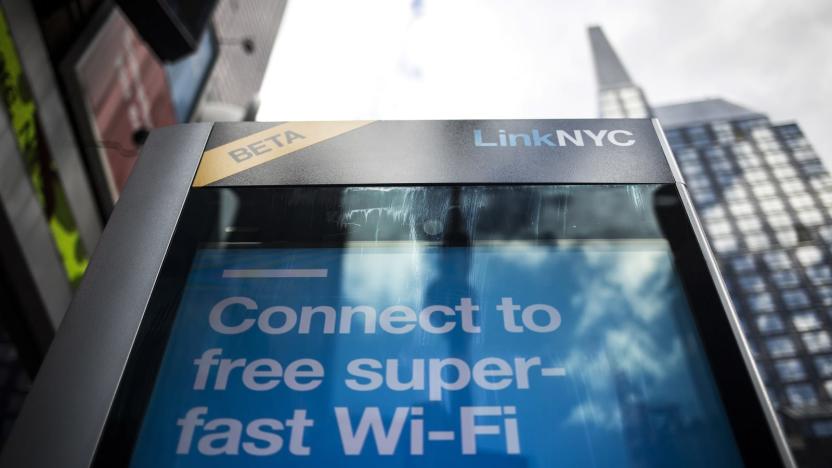
New York City's free gigabit WiFi comes to Brooklyn
LinkNYC's free, gigabit-grade WiFi is all over large chunks of New York City, but there's a conspicuous Brooklyn-sized gap... or rather, there was. The communication network has switched on its first two Brooklyn kiosks, both of them on Fulton Street in the Bed-Stuy area. Don't worry about having to visit a small part of the borough to get no-cost internet access, though. There are nine other Brooklyn hotspots due to go online in the weeks ahead, including some near LIU-Brooklyn and Prospect Park.
Jon Fingas11.14.2016
Nokia wires an apartment complex with 52Gbps fiber
It's one thing to wire a house with gigabit fiber, but it's another matter to outfit an entire apartment building -- you need a huge pipeline to accommodate everyone. Nokia, however, might have a solution. It just partnered with SK Broadband to wire an apartment complex in Seoul, South Korea with fiber optics delivering aggregate speeds of 52.5Gbps. That doesn't guarantee that every user will get that speed (only "selected" customers saw those rates), but it increases the chances that you'll receive gigabit-class bandwidth in your rental.
Jon Fingas10.18.2016
Google WiFi is a router that simplifies whole-home wireless
Those rumors of Google giving WiFi routers another shot? They're true. Meet Google WiFi, a router designed entirely in-house... and with a few nice advantages over the OnHub line. Apart from being much smaller (no vase-like design here), its big trick is its ability to create an Eero-style mesh network. You only have to add additional units to your network to improve coverage -- there's a Network Assistant app that makes it easy to add more routers and improve your signal.
Jon Fingas10.04.2016
Terabit fiber optic speeds just came closer to reality
Sure, researchers have been showing off terabit data speeds in fiber optics for years, but they've seldom been practical. That exotic technology may work over long distances, but it can quickly fall apart when you throw typical network loads in the mix. However, it's about to become much more practical. Nokia Bell Labs, Deutsche Telekom and the Technical University of Munich have shown off 1Tbps data speeds in a field trial that involved "real conditions," with varying channel conditions and traffic levels.
Jon Fingas09.18.2016
The Linksys EA9500 pierced my apartment's WiFi-proof walls
I live in a two-bedroom San Francisco apartment built in 1916. It has a view of the bay and the top of the Golden Gate bridge. There's crown molding, high ceilings and some pretty dope neighbors. It should be perfect. And it is -- if you're cool with plaster walls blocking 90 percent of all WiFi signals.
Roberto Baldwin09.17.2016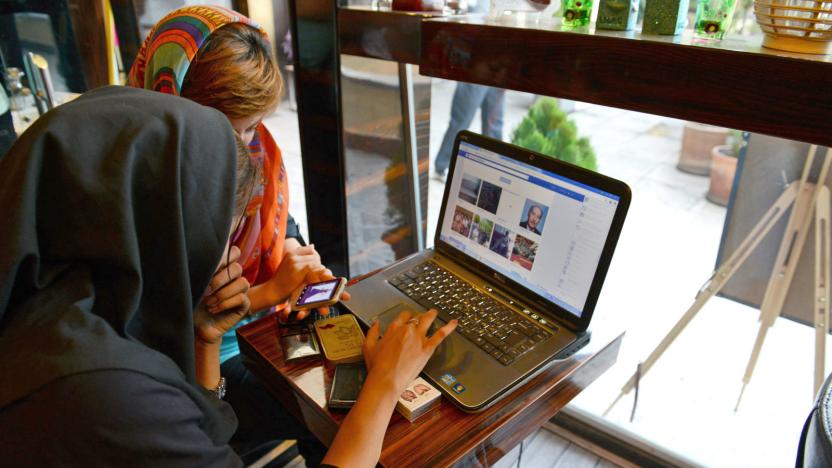
Iran launches the first part of its national data network
Iran made a lot of fuss about creating a national data network way back in 2005, and after 11 years it's finally ready... sort of. The country has launched the first phase of the network, which promises speeds up to 60 times faster than conventional internet in the area thanks to both local data centers and high-speed fiber optic lines. It'll only truly be finished by March 2017 (when the second and third phases will be in place), but the government claims that it'll be a "reliable, stable and safe" network that improves Iran's economy and overall independence.
Jon Fingas08.29.2016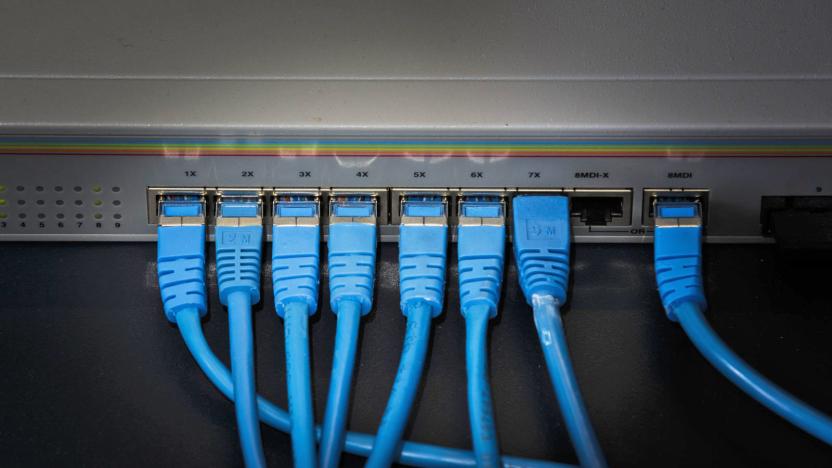
MIT's smarter routers promise to fight crowded networks
MIT hates overcrowded networks just as much as you do, and its CSAIL division has made two breakthroughs that could clear up the data pipes. To begin with, it's developing programmable routers that can still keep up with bandwidth-heavy services like streaming video. Instead of trying to create an elaborate rule system for deciding which data packets get through (which could bog a router down or consume a lot of chip space), researchers broke things down into simple computing elements that could handle a wide range of tasks. You'd only have to combine different elements to achieve the intended effect, which could help networks adapt to new conditions -- that hot new mobile game might not cause chaos.
Jon Fingas08.23.2016
TP-Link settles with the FCC over risky WiFi router power levels
When the FCC said it was cracking down on WiFi routers that can operate at power levels that might cause interference, it wasn't kidding around. TP-Link has agreed to a settlement with the FCC that will have the company both keep its router power levels in check and shell out a relatively small $200,000 fine. As with Linksys, though, it's not asking TP-Link to block unofficial firmware that could break the rules. Just the opposite, in fact -- TP-Link has agreed to talk to both open source teams (think OpenWrt) and wireless chipset makers to enable third-party firmware that abides by FCC guidelines. While this isn't exactly a back-breaking penalty for TP-Link, it could serve as a warning to other router makers that might veer from the straight and narrow.
Jon Fingas08.01.2016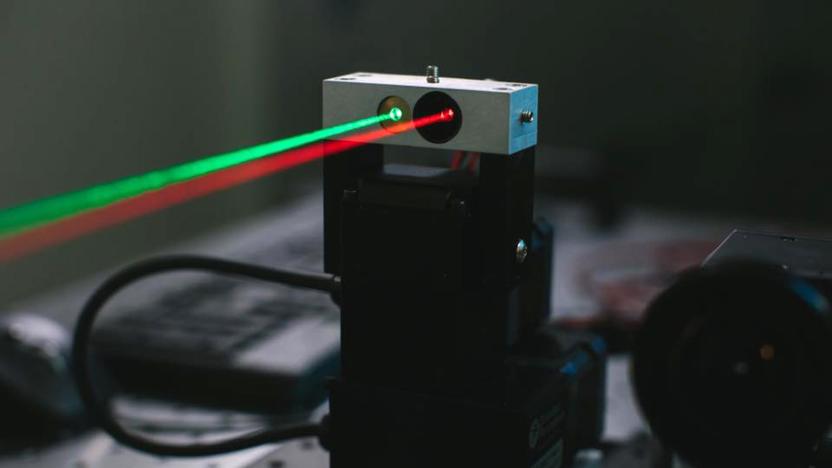
Facebook details a way to offer laser-based internet access
Have you wondered how Facebook might offer high-speed internet access using lasers? The company's Connectivity Lab is happy to show you. It just published a research paper explaining laser beam technology can deliver up to 2Gbps to remote places. The trick, it says, is to use fluorescent optical fibers to collect the light instead of relying on traditional optics. Since the fibers don't emit the same color that they're absorbing, you can shine a brighter light at them (similar to a solar concentrator) and manage an extremely quick turnaround time of under 2 nanoseconds. Combine that with multi-stream data encoding and you get the ample bandwidth that's normally reserved for WiFi and wired networks.
Jon Fingas07.19.2016
WiFi spec update promises to double your wireless speeds
You might not have to wait until 802.11ad arrives in earnest to get a big boost in WiFi network speeds. The Wi-Fi Alliance has officially debuted the 802.11ac wave 2 standard, which promises a big leap in speed without reinventing the wheel. It doubles the bandwidth per channel, which could double your performance in good conditions. You're more likely to hit those speeds, too. There's an additional spatial stream and wider 5GHz channel support, and MU-MIMO (multi-user, multiple input multiple output) lets routers send data to multiple devices at the same time -- you're less likely to see your download bog down because someone else in your home is streaming video.
Jon Fingas06.29.2016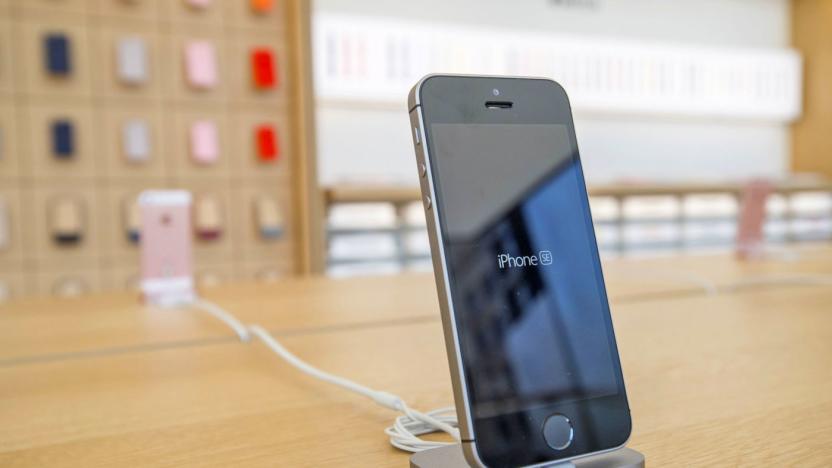
Apple faces Caltech lawsuit over WiFi patents
Apple's legal troubles with schools aren't over yet: Caltech has sued Apple and chipmaker Broadcom for allegedly violating four WiFi-related patents. Supposedly, most Apple devices (including the iPhone, iPad, Mac and Apple Watch) from the iPhone 5 onward use Broadcom chips that copy Caltech decoding and encoding technology to improve data flow. As with most such lawsuits, the institute is calling for both damages and a ban on offending hardware.
Jon Fingas05.30.2016
New York City rolls out its first WiFi-equipped buses
When the Metropolitan Transportation Authority promised that New York City's WiFi-packing buses would arrive sometime in the second or third quarter of this year, it was clearly being cautious -- the first wave of those buses is rolling out today. Visit Queens and you'll see seven internet-savvy people carriers roaming the streets, with a total of 75 in the borough this summer. That's still tiny next to the 2,042 planned buses for the entire city, but it'll be helpful if you just have to get your tablet online when you're in South Jamaica.
Jon Fingas05.17.2016
Linksys will let you use open router code under new FCC rules
While the FCC's imminent rules for wireless device interference are supposed to allow hackable WiFi routers, not every router maker sees it that way. TP-Link, for instance, is blocking open source firmware out of fear that you'll run afoul of the regulations when they kick in on June 2nd. However, you won't have to worry about that with Linksys' fan-friendly networking gear. The Belkin-owned brand promises Ars Technica that its modifiable routers will allow open source firmware while obeying the FCC's rules -- you can tinker without fear of messing with nearby radar systems.
Jon Fingas05.15.2016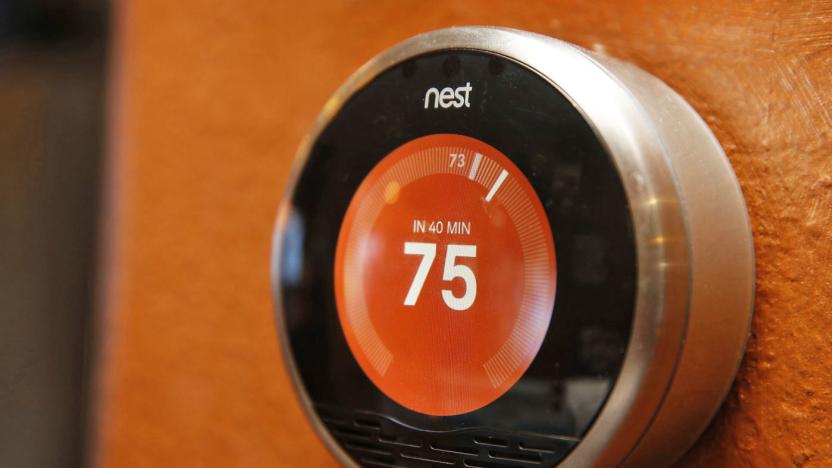
Nest opens the networking code for its smart home devices
Nest already has a bunch of companies lined up to use its Thread network protocol in their devices (over 30 submitted right now), but it's not content with what's on deck. The Alphabet-owned company has created an open source version, OpenThread, that lets anyone implement the smart home-oriented technology in their connected gadgets. In theory, it doesn't take much work -- Thread is already an IPv6 protocol, so any device that handles the 802.15.4 standard (used for low-rate personal networks) should only need a few tweaks to play nicely.
Jon Fingas05.11.2016
Comcast bumps its trial data caps to 1TB
The frustration with Comcast's trial data caps doesn't just center around their existence -- it's that they're too low for many users. A 300GB monthly limit isn't much in an era where even software updates can chew up a few gigabytes, let alone 4K videos or downloadable games. However, Comcast is tackling some of those complaints. It's increasing the cap in all its trial regions to 1TB by June 1st, regardless of what tier you're using. That's still not ideal, but it reduces the chances that you'll have to choose between watching Netflix and backing up your photos.
Jon Fingas04.27.2016
EU invests 1 billion Euros to make quantum computing practical
The European Union doesn't want to simply wait around while scientists figure out the fundamentals of quantum computing; it's giving the concept a big financial boost, too. The European Commission has revealed plans for a €1 billion ($1.13 billion) "quantum technologies flagship" that, like other EU-level efforts, aims to turn scientific discoveries into practical realities. The Commission expects the project to help everything from motion sensors in phones to virtually unhackable communications. Honest-to-goodness quantum computers are some of the long-term goals, the EU says.
Jon Fingas04.25.2016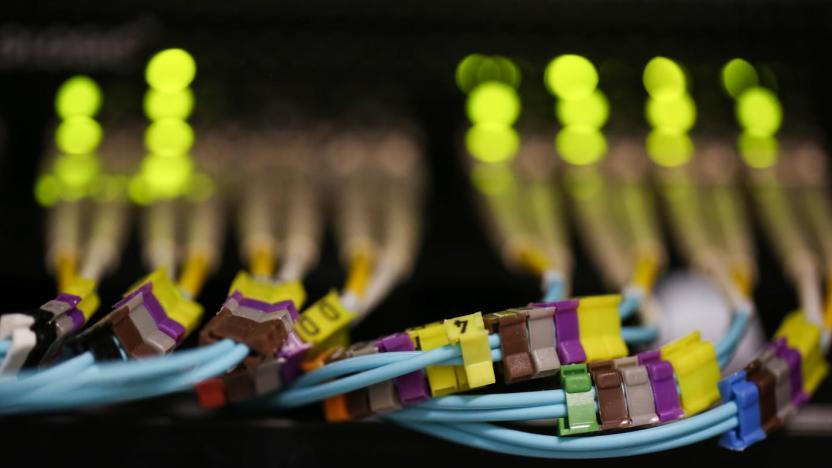
Scientists push a record 57Gbps through fiber optic lines (update)
Need proof that the limits of fiber optic technology have been shattered? You just got it. University of Illinois researchers report that they've set a record for fiber data transmission, delivering 57Gbps of error-free data. And importantly, they sent the data at room temperature -- they didn't have to cool things down to keep those bits going. Even when things got toasty (185F), the technology could still deliver a brisk 50Gbps.
Jon Fingas03.24.2016